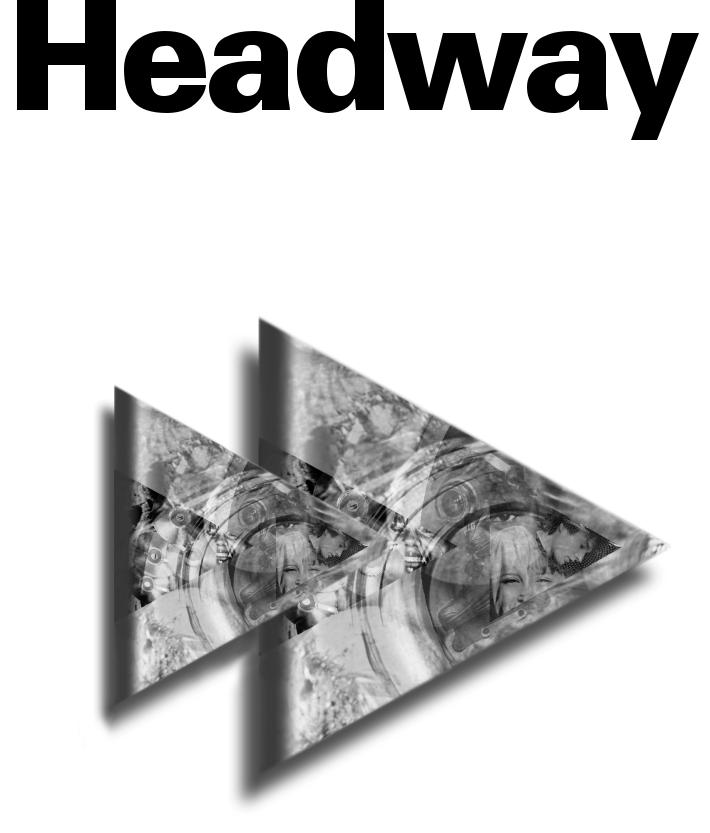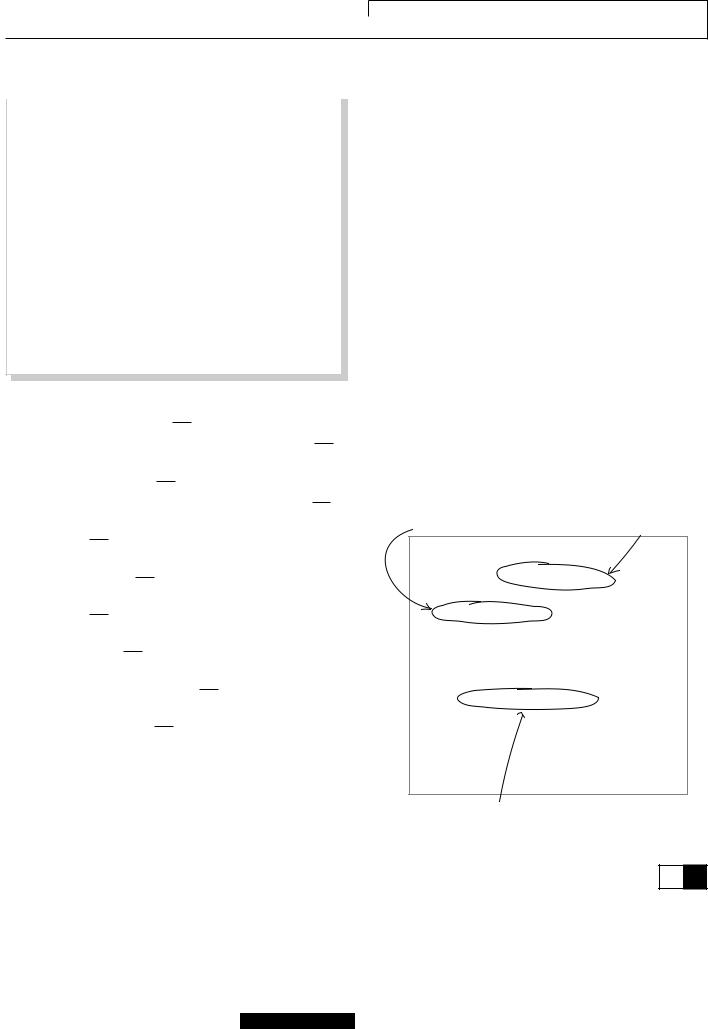
Advanced Tests
.pdf
New
Advanced Tests
Peter May
2


New Headway Advanced
Test Booklet
Note to the teacher
This booklet contains
•12 Unit Tests which revise the corresponding unit in New Headway Advanced Student’s Book. Each test has a total score of 100.
•An Answer Key for all the exercises.
These tests may be photocopied freely for classroom use. They may not be adapted, printed, or sold without the permission of Oxford University Press.
Students will need a separate sheet of paper for the writing activity at the end of each test.

1Test
1 Match the questions with the correct responses.
1 Do you think you’ll get the job?
2 Do you live near the town centre?
3 Would you like to go out with me tonight? 4 Did you have to go for an interview?
5 Have you sorted out that problem yet?
6 Don’t you think the medical officers were rather strict?
a Yes, but I didn’t want to. b Well, they had to be.
c No, I still haven’t managed to. d Yes, I’m hoping to.
e No, but I used to. f Yes, I’d love to.
0.5 points for each correct answer |
|
3 |
|
|
|
2 Complete the responses with the words in the box and to.
beginning afraid planning allowed hope promised
1 |
A I’m sorry, but I can’t help you today. |
|
|
|
||||||||||
|
B But you |
|
! |
|
|
|
|
|
|
|
|
|
|
|
|
|
|
|
|
|
|
|
|
|
|||||
2 |
A Would you like to emigrate to Australia? |
|
|
|
||||||||||
|
B Yes, in fact one day I |
|
|
|
. |
|
|
|
|
|
|
|
||
|
|
|
|
|
|
|
|
|
|
|||||
3 |
A Why didn’t you tell me this sooner? |
|
|
|
|
|
|
|||||||
|
B I thought you’d get angry and I was |
|
|
|
|
. |
||||||||
|
|
|
|
|
||||||||||
4 |
A Are the roses flowering yet? |
|
|
|
|
|
|
|
|
|||||
|
B Not all of them, but some are |
|
|
|
|
. |
|
|
|
|||||
5 |
A Why don’t you leave the office early? |
|
|
|
||||||||||
|
B I would, but the boss says we’re not |
|
|
|
|
. |
||||||||
6 |
A Did Pete meet up with Kate yesterday? |
|
|
|
||||||||||
|
B Not sure. I know he was |
|
|
|
. |
|
|
|
|
|||||
|
|
|
|
|
|
|
|
|
|
|
|
|
|
|
|
|
0.5 points for each correct answer |
|
|
3 |
|||||||||
|
|
|
|
|
|
|
|
|
|
|
|
|
|
|
3Cross out the words in B that can be omitted.
1A Make sure you take your passport.
B Don’t worry, I will take it.
2A Would you stay in this country if you could?
B Yes, I would stay if I could.
3A Do you think the others got lost on the way?
B Yes, they might have got lost.
N A M E :
4A I didn’t bring any money with me.
B Oh – you should have brought some.
5A Do you think the border guards are expecting us?
B They could be expecting us.
6A Maybe that man was working for them.
B Yes, he might have been working for them.
0.5 points for each correct answer |
|
3 |
|
|
|
4 Write a positive and a negative short response.
Example: |
He’s been very busy recently. |
|
||||
|
|
Positive: Yes, he has. Negative: No, he hasn’t. |
||||
1 |
Jenny speaks Greek well. |
|
||||
|
Positive: |
|
Negative: |
|
|
|
2 |
Are you staying in tonight? |
|
||||
|
Positive: |
|
Negative: |
|
|
|
3 |
Both trains were running late. |
|
||||
|
Positive: |
|
Negative: |
|
|
|
4 |
They’ll change the law soon. |
|
||||
|
Positive: |
|
Negative: |
|
|
|
5 |
Most immigrants arrived in the 19th century. |
|
||||
|
Positive: |
|
Negative: |
|
|
|
6 |
He should have been sent to prison. |
|
||||
|
Positive: |
|
Negative: |
|
|
|
7 |
You’d have won if you’d tried harder. |
|
||||
|
Positive: |
|
Negative: |
|
|
|
8 |
They’ll have been waiting for us. |
|
||||
|
Positive: |
|
Negative: |
|
|
|
|
|
|
|
|
|
|
|
|
1 point for each correct answer |
|
8 |
||
|
|
|
|
|
|
|
5 Complete the sentences with the words in the box.
|
|
so too neither either |
though |
|
|
|
|
|
|
|
|
|
|
|||
|
|
|
|
|
|
|
|
|
|
|
|
|
|
|
|
|
1 |
I wouldn’t like to live there, and |
|
|
|
|
would you. |
||||||||||
|
|
|
||||||||||||||
2 |
Paul doesn’t like Indian food. I do, |
|
|
|
. |
|
|
|
||||||||
|
|
|
|
|
|
|||||||||||
3 |
I won’t be staying here, and the others won’t, |
|
|
|
|
|
. |
|||||||||
|
|
|
|
|
||||||||||||
4 |
Carla’s intelligent, and |
|
|
|
is her brother. |
|
|
|
||||||||
|
|
|
|
|
|
|||||||||||
5 |
My family come from Hungary, and hers do |
|
|
|
|
|
. |
|||||||||
|
|
|
|
|
|
|
|
|
|
|
|
|
|
|||
|
|
0.5 points for each correct answer |
|
2.5 |
|
|||||||||||
|
|
|
|
|
|
|
|
|
|
|
|
|
|
|
|
|
4 |
U N I T 1 Test |
New Headway Advanced © Oxford University Press P H O T O C O P I A B L E |

N A M E :
6Which countries are these people from?
1 A Pole
2 A Spaniard
3 A Dutchman
4 A Turk
5 A Swede
6 A Frenchwoman
7 A Scot
8An Afghan
9A Welshman
10A Dane
0.5 points for each correct answer |
|
5 |
|
|
|
7 Complete the nationalities in each group with the same ending.
1 Brit
Dan
Pol
Scott
Span
Swed
Turk
2Argentin Austral Belg Ital Peruv
3Cze Dut
Fren
4 Iceland
5Sw
6Americ
Germ
Keny
0.5 points for each correct answer |
|
3 |
|
|
|
8Which languages are spoken in these countries?
1 Wales
2 China
3 Syria
4 Peru
0.5 points for each correct answer |
|
2 |
|
|
|
9American or British English? Write US or UK.
1 I’ll see you at the weekend.
2 Did the Hong Kong plane arrive yet?
3 Most immigrants live in blocks of flats.
4 Get a bottle from the liquor store.
5 There are long vacations in this job.
6 They had a really bad journey.
7 The office is open from Monday to Friday.
8 We had to stand in line for hours.
0.5 points for each correct answer |
|
4 |
|
|
|
10 Pair the British English (UK) and American English (US) words.
|
bill post biscuit check closet |
|
|
||||||
|
pavement restroom autumn |
rubbish mail |
|
|
|||||
|
pants |
garbage bathrobe fall |
cupboard |
|
|
||||
|
cookie |
loo trousers sidewalk dressing-gown |
|
|
|||||
|
|
|
|
|
|
|
|
|
|
1 |
|
|
(UK) and |
|
|
(US) |
|
|
|
2 |
|
|
(UK) and |
|
|
(US) |
|
|
|
3 |
|
|
(UK) and |
|
|
(US) |
|
|
|
4 |
|
|
(UK) and |
|
|
(US) |
|
|
|
5 |
|
|
(UK) and |
|
|
(US) |
|
|
|
6 |
|
|
(UK) and |
|
|
(US) |
|
|
|
7 |
|
|
(UK) and |
|
|
(US) |
|
|
|
8 |
|
|
(UK) and |
|
|
(US) |
|
|
|
9 |
|
|
(UK) and |
|
|
(US) |
|
|
|
10 |
|
|
(UK) and |
|
|
(US) |
|
|
|
|
|
|
|
|
|
|
|
|
|
|
|
|
|
0.5 points for each correct answer |
|
5 |
|||
|
|
|
|
|
|
|
|
|
|
11Rewrite the sentences in British English.
1 Where can I get some gas for the truck?
2 There’s a drugstore open all night downtown.
3 Take the elevator down to the first floor.
4 The movie starts at ten of nine.
5 Call me on your cellphone from the parking lot.
1 point for each correct answer |
|
5 |
|
|
|
New Headway Advanced © Oxford University Press P H O T O C O P I A B L E |
Test U N I T 1 |
5 |

N A M E :
12Read the text and circle the letter of the word which best fits each space.
Every year, large numbers of desperately poor people, many of them
(1) ... from war and oppression in Sub-Saharan countries, illegally attempt to cross the narrow straits between North Africa and Europe’s southern border. Dreaming (2) ... a new life in prosperous Spain, or further north, they are often (3) ... by people-traffickers into handing over their life savings, (4) ... advance, for a tiny boat. These unscrupulous men (5) ... to tell them about the terrible dangers of the crossing, and the (6) ... immigrants, many of them unable to swim, set off in unseaworthy boats wearing (7) ... clothing. This is a (8) ... for disaster. The powerful currents and changeable weather sink many of the boats, with the number of victims (9) ... to be in the hundreds annually. Those few who make it to the coast, often suffering (10) ...
exposure, are likely to be picked up quickly by the ever (11) ... Spanish authorities, who then (12) ... them back to where they came from.
1 |
a siblings |
b refugees |
c descendants |
|
||
2 |
a of |
b with |
c in |
|
||
3 |
a deceived |
b distracted |
c disappointed |
|
||
4 |
a on |
b in |
c at |
|
||
5 |
a avoid |
b bother |
c neglect |
|
||
6 |
a joint |
b successive |
c prospective |
|
||
7 |
a extravagant |
b inadequate |
c quaint |
|
||
8 |
a dose |
b quota |
c recipe |
|
||
9 |
a estimated |
b nominated |
c complemented |
|||
10 |
a about |
b from |
c of |
|
||
11 |
a alert |
b stumped |
c philanthropic |
|
||
12 |
a clasp |
b deport |
c enhance |
|
||
|
|
|
|
|
|
|
|
|
1 point for each correct answer |
|
|
12 |
|
|
|
|
|
|
|
|
13 Match the words in A with their synonyms in B.
A |
|
|
B |
1 |
|
diverse |
a horrible |
2to pass away b to shake slightly
3timber c disappointment
4 |
|
wounded |
d |
wood |
|
|
5 |
|
to tremble |
e |
to improve |
|
|
6 |
|
gruesome |
f |
varied |
|
|
7 |
|
to face |
g |
to die |
|
|
8 |
|
to enhance |
h |
hurt |
|
|
9 |
|
blow |
i |
to stand opposite |
|
|
|
|
|
|
|
|
|
|
|
|
0.5 points for each correct answer |
|
4.5 |
|
|
|
|
|
|
|
|
14Complete the second sentence so that it has a similar meaning to the first, using the word in capitals. Don’t change this word. Write between three and five words.
1You should take her away from the group and warn her. ASIDE
You should |
|
and |
|
||
warn her. |
|
|
2People in that country don’t trust the police. FAITH
People in that country have the police.
3They can’t make any progress now that it is raining. STANDSTILL
Everything has
now that it is raining.
4I use a knife to open tins and that works, usually. PURPOSE
I use a knife to open tins and that
,usually.
5You must memorize this message, and then destroy it. HEART
You must |
|
|
|
, and |
||
|
|
|
||||
then destroy it. |
|
|
|
|
||
6 She’s going to try again to get a visa. |
|
|
|
|
||
SHOT |
|
|
|
|
||
She’s going to |
|
|
|
a visa. |
||
|
|
|||||
|
|
|
|
|
|
|
|
|
1 point for each correct answer |
|
|
|
6 |
|
|
|
|
|
|
|
15 Read the text. Are the statements true (T) or false (F)?
Culture shock describes the range of feelings and symptoms that can occur as a result of moving from a familiar to an unfamiliar culture. It includes the shock of a new environment, meeting lots of new people, and learning the ways of a different country. It also includes
5the shock of being separated from the important people in your life, maybe family, friends, colleagues, teachers; people you would normally talk to during times of uncertainty, people who give you support and advice.
Despite its name, culture shock is not quite as sudden as most
10 people expect. The first few days in a new country can be a time of great excitement, when everything is new and intriguing. However, this period of excitement can fade as differences create an impact and you may start to feel confused, isolated, and inadequate as cultural differences intrude and familiar supports (e.g. family and
15friends) are not immediately available. Symptoms you may experience include physical complaints and a loss of appetite, sleep
6 |
U N I T 1 Test |
New Headway Advanced © Oxford University Press P H O T O C O P I A B L E |

N A M E :
disturbances, lack of concentration, and fatigue. This is probably the most difficult phase for any new student and it is important to remember that what you are feeling is a normal reaction for
20 someone who has moved to new surroundings.
Next you may become very hostile to the new culture, and very conscious of all that you dislike about it. Despite what you may think, this is actually quite a healthy reaction as you are reconnecting with what you value about yourself and your own
25culture. You will hopefully progress from here to being able to accept the differences and similarities between the two cultures. This should lead to feelings of increased confidence, as you gain experience and are better able to cope with new situations.
Finally, most students come to value the differences and
30 similarities between the two cultures, to the point where most situations are enjoyable and you are able to make choices according to your preferences and values.
1Talking to people you haven’t met before can be a cause of culture shock.
2You may miss the people you used to work with.
3Culture shock usually hits you as soon as you arrive in the foreign country.
4You may enjoy being in the new country at first.
5Because of culture shock, you might not feel hungry.
6The worst time is when you start to hate things about the new culture.
7You must avoid having negative feelings about the new culture.
8To be happy, you need to find out what is the same in both cultures.
9You will feel sure of yourself when you learn how to avoid unfamiliar situations.
10You will probably learn to choose what suits you best from both cultures.
1 point for each correct answer |
|
10 |
|
|
|
16 Circle the best definition, a or b, for the words from the text.
1 |
range of (line 1) |
|
|
a many reasons for |
b many different kinds of |
2 |
intriguing (line 11) |
|
|
a very interesting |
b very boring |
3 |
fade (line 12) |
|
|
a become stronger |
b become weaker |
4 |
inadequate (line 13) |
|
|
a not patient enough |
b not competent enough |
5 |
intrude (line 14) |
|
|
|
|
a start to bother you |
b become less important |
||
6 |
surroundings (line 20) |
|
|
|
|
a living conditions |
b problems |
|
|
7 |
value (line 24) |
|
|
|
|
a consider important |
b consider unimportant |
||
8 |
cope with (line 28) |
|
|
|
|
a run away from |
b deal with successfully |
||
|
|
|
|
|
|
0.5 points for each correct answer |
|
4 |
|
|
|
|
|
|
17Read the advert and write a letter to the organization. Give details about yourself and ask for more information about the things circled. Follow the advice below.
Before you start writing, decide whether you should:
•put your address and the date at the top or bottom of your letter.
•begin your letter Dear Susan or Dear Ms Mills.
•use formal or informal language.
•only ask for information, or both ask for and give information.
which ones? |
starting when? |
VOLUNTEERS INTERNATIONAL
Work abroad: 2-month contracts
We send young people of many nationalities to developing countries, where they help local people with environmental and community projects, e.g. improving water supplies, setting up schools.
You should be aged 18–26, reasonably fit, and able to communicate in English.
Interested?
Phone Susan Mills on + 44 151 843 6407, or write to her at: Volunteers International,
36 Croxteth Avenue, Liverpool, LI2 5RY.
to what level?
Maximum number of points possible |
|
20 |
|
|
|
TOTAL 100
New Headway Advanced © Oxford University Press P H O T O C O P I A B L E |
Test U N I T 1 |
7 |

2 |
|
|
|
N A M E : |
|
|
|
|
|
Test |
|
1Match the verb tenses a–l with the forms used in the sentences.
a |
present perfect |
g |
future perfect passive |
b |
present perfect passive |
h |
past simple passive |
c |
future simple passive |
i |
past continuous passive |
d |
future continuous |
j |
past perfect |
e |
future perfect |
k |
past perfect passive |
f |
future perfect continuous |
l |
past perfect continuous |
1I’d bumped into her once before.
2The effects will have worn off soon.
3The film was based on a book.
4He’s never concealed his true feelings.
5I’ll be staying with friends next week.
6Her talent has been wasted.
7He’d been misquoted in the press.
8By June, I’ll have been working here for a year.
9They’d been going out together for ages.
10It will have been dealt with soon.
11 The books were already being printed.
12 Your message will be conveyed to him.
0.5 points for each correct answer |
|
6 |
|
|
|
2Circle the correct form of the verb. If both forms are possible, choose the most likely.
1 The office is cleaned / is being cleaned at the moment. 2 At last! I ’ve stood / ’ve been standing here for hours!
3 He abandoned / was abandoning his wife and children.
4 I ’ll wait / ’ll be waiting for you at the bus stop when the bus gets there.
5 I think that player has broken / has been breaking his leg.
6 What are you doing / do you do? Are you a journalist or a playwright?
7 She had / was having dinner when the phone rang.
8 According to the timetable, the train arrives / is arriving at 8.27.
9I never believe / am never believing a word he says.
10Are you coming / Do you come for a drink after work?
0.5 points for each correct answer |
|
5 |
|
|
|
3Match the beginnings of each pair of sentences with the most likely endings.
1The fields are ploughed
2The fields are being ploughed a as we stand here watching. b at this time of the year.
3We lost that match,
4We were losing that match,
abut in the end we won.
bbut we’ll win the next one.
5I’ve read that book
6I’ve been reading that book a at least three times.
b for the last six hours.
7I stay with friends
8I’m staying with friends
awhenever I go to Paris.
buntil I find a new flat.
9In the morning I’ll sleep
10In the morning I’ll be sleeping
awhen the alarm clock goes off.
buntil the alarm clock goes off.
11I’ve done the housework
12I’ve been doing the housework a so there’s nothing more to do.
b but there’s still a bit more to do.
0.5 points for each correct answer |
|
6 |
|
|
|
8 |
U N I T 2 Test |
New Headway Advanced © Oxford University Press P H O T O C O P I A B L E |

N A M E :
4For each sentence, put a tick or correct the verb form.
1 George Orwell has written 1984 shortly before he died. 2 Have you ever read anything by Jane Austen?
3 We live in this part of town since 2003.
4 We’ll decide when we’ve seen all the figures.
5 Hello, I come to ask for some information.
6 I wish I had time to go to the theatre last week.
7 When I take my final exams at university, I’ll look for a job.
8 We went to the same place three times this year.
9The film will end by the time you get there.
10Now he wishes he hadn’t left early yesterday.
0.5 points for each correct answer |
|
5 |
|
|
|
5Complete the sentences with the correct form of the verbs in brackets.
1 |
The new Harry Potter book (come out) |
|
|
|
|
||||||||||||||||||||||||||||
|
|
|
|
||||||||||||||||||||||||||||||
|
last month, but I (not buy) |
|
|
|
|
|
|
|
|
|
|
|
it yet. |
|
|||||||||||||||||||
|
|
|
|
|
|
|
|
|
|
|
|
|
|||||||||||||||||||||
2 |
Yesterday I (have to) |
|
|
|
|
|
|
|
|
|
|
|
|
|
go back home |
|
|||||||||||||||||
|
|
|
|
|
|
|
|
|
|
|
|
|
|
||||||||||||||||||||
|
because I (leave) |
|
|
|
|
|
|
|
|
|
my books in my room. |
||||||||||||||||||||||
|
|
|
|
|
|
|
|
|
|
||||||||||||||||||||||||
3 |
Since she (start) |
|
|
|
|
|
|
|
|
|
|
|
|
|
the detective novel, she |
||||||||||||||||||
|
|
|
|
|
|
|
|
|
|
|
|
||||||||||||||||||||||
|
(suffer from) |
|
|
|
|
|
|
|
|
|
|
|
|
writer’s block twice. |
|
||||||||||||||||||
|
|
|
|
|
|
|
|
|
|
|
|
|
|
||||||||||||||||||||
4 |
I (find out) |
|
|
|
|
|
|
|
|
|
about it earlier today, but I |
||||||||||||||||||||||
|
|
|
|
|
|
|
|
|
|||||||||||||||||||||||||
|
wish I (know) |
|
|
|
|
|
|
|
|
|
|
|
|
before. |
|
||||||||||||||||||
|
|
|
|
|
|
|
|
|
|
|
|
|
|
||||||||||||||||||||
5 |
Anna and Joe (get) |
|
|
|
|
|
|
|
|
|
|
|
|
married two years |
|||||||||||||||||||
|
|
|
|
|
|
|
|
|
|
|
|
||||||||||||||||||||||
|
ago, but they (be) |
|
|
|
|
|
|
|
|
|
|
|
separated for the last |
||||||||||||||||||||
|
|
|
|
|
|
|
|
|
|
|
|
||||||||||||||||||||||
|
six months. |
|
|
|
|
|
|
|
|
|
|
|
|
|
|
|
|
|
|
|
|
||||||||||||
6 |
When my aunt (have) |
|
|
|
|
|
|
|
|
|
|
|
|
|
her operation |
|
|||||||||||||||||
|
|
|
|
|
|
|
|
|
|
|
|
|
|
||||||||||||||||||||
|
next week, she (feel) |
|
|
|
|
|
|
|
|
|
|
|
|
|
|
a lot better. |
|
||||||||||||||||
|
|
|
|
|
|
|
|
|
|
|
|
|
|
|
|||||||||||||||||||
7 |
I (come from) |
|
|
|
|
|
|
|
Italy. In fact, I |
|
|||||||||||||||||||||||
|
|
|
|
|
|
|
|
||||||||||||||||||||||||||
|
(be born) |
|
|
near Milan. |
|
||||||||||||||||||||||||||||
|
|
|
|
||||||||||||||||||||||||||||||
8 |
I (not enjoy) |
|
|
|
|
|
|
|
|
|
|
|
|
|
holidaying in Ibiza when I |
||||||||||||||||||
|
|
|
|
|
|
|
|
|
|
|
|
||||||||||||||||||||||
|
was a child, but I wish I (be) |
|
|
|
|
|
|
|
|
|
|
|
there now. |
||||||||||||||||||||
|
|
|
|
|
|
|
|
|
|
|
|
||||||||||||||||||||||
|
|
|
|
|
|
|
|
|
|
|
|
|
|
|
|
|
|
|
|
|
|
|
|
|
|
|
|
|
|
|
|
|
|
|
|
|
|
|
|
|
|
|
|
|
1 point for each correct answer |
|
|
8 |
|||||||||||||||||||
|
|
|
|
|
|
|
|
|
|
|
|
|
|
|
|
|
|
|
|
|
|
|
|
|
|
|
|
|
|
|
|
|
|
6Complete the sentences with the correct passive form of the verbs in the box. There is one verb you do not need to use.
|
|
borrow |
ensure |
entitle |
introduce |
convert |
|
|||||||
|
|
invest |
beckon |
imprison |
reward |
|
|
|
|
|
||||
|
|
|
|
|
|
|
|
|
|
|
|
|
||
1 |
At present, the old theatre building |
|
|
|
into |
|||||||||
|
|
a nightclub. |
|
|
|
|
|
|
|
|
||||
2 |
A weakness of the book is that too many new |
|||||||||||||
|
|
characters |
|
|
|
too quickly. |
||||||||
3 |
Throughout history, writers |
|
|
|
and even |
|||||||||
|
|
executed for the contents of their books. |
||||||||||||
4 |
Of course, it’s not a tragedy, so all the hero’s efforts |
|||||||||||||
|
|
|
|
|
|
|
in the final scene. |
|
|
|
|
|
||
5 I don’t think the plot is original. I suspect the idea from a Greek myth.
6 James Joyce’s book of short stories, published in 1914,
Dubliners.
7 High-volume sales can |
|
by organizing a |
big publicity campaign. |
|
|
8 By the end of this year, twenty per cent more money in cultural projects.
0.5 points for each correct answer |
|
4 |
|
|
|
7 Rewrite the sentences beginning with the words given.
1 |
Pinter didn’t actually write that play. |
|
|
|
|
|
|
|||||||||
|
That play |
|
|
|
|
|
|
|
|
|
. |
|||||
|
|
|
|
|
|
|
|
|
|
|||||||
2 |
One of the office staff was using the photocopier. |
|
|
|
|
|
|
|||||||||
|
The photocopier |
|
|
|
|
|
|
. |
||||||||
3 |
Historians are finding new evidence all the time. |
|
|
|
|
|
|
|||||||||
|
New evidence |
|
|
|
|
|
|
|
. |
|||||||
4 |
They’ve put the ceremony off until next Monday. |
|
|
|
|
|
|
|||||||||
|
The ceremony |
|
|
|
|
|
. |
|||||||||
5 |
A note on the last page acknowledges his contribution. |
|||||||||||||||
|
His contribution |
|
|
|
. |
|||||||||||
6 |
They will probably have sold all copies by tomorrow. |
|||||||||||||||
|
All copies |
|
|
|
. |
|||||||||||
7 |
Somebody has tampered with the safety equipment. |
|||||||||||||||
|
The safety equipment |
|
|
. |
||||||||||||
8 |
They might award her the prize for her first novel. |
|
|
|
|
|
|
|||||||||
|
She |
|
|
|
|
|
|
|
|
|
|
|
|
. |
||
|
|
|
|
|
|
|
|
|
|
|
|
|
|
|
|
|
|
|
|
|
|
|
|
|
1 point for each correct answer |
|
8 |
|
|
|
|
||
|
|
|
|
|
|
|
|
|
|
|
|
|
|
|
|
|
New Headway Advanced © Oxford University Press P H O T O C O P I A B L E |
Test U N I T 2 |
9 |

N A M E :
8Complete the phrasal verbs in each pair of sentences with the same verb.
1 |
a I see they’ve |
|
|
|
the price of music CDs up |
||||||
|
|
|
|||||||||
|
yet again. |
|
|
|
|
|
|
|
|
||
|
b We can |
|
|
you up at our place if you’ve |
|||||||
|
|
|
|||||||||
|
missed the last bus. |
|
|
|
|
||||||
2 |
a My parents still can’t |
|
|
|
out how to use the |
||||||
|
|
|
|||||||||
|
video. |
|
|
|
|
|
|
|
|
||
|
b Professional sports people have to |
|
|
out |
|||||||
|
|
|
|||||||||
|
for many hours. |
|
|
|
|
|
|
|
|
||
3 |
a Before she died, the author |
|
|
|
away most of |
||||||
|
|
|
|||||||||
|
her money. |
|
|
|
|
|
|
|
|
||
b He wrote under a pseudonym, but his writing style him away.
4 |
a There was so much to see in Prague that I couldn’t |
|||||||||||||||
|
|
|
|
it all in. |
|
|
|
|
|
|
|
|
|
|
||
|
|
|
|
|
|
|
|
|
|
|
|
|
|
|||
|
b In the story, they |
|
|
|
|
|
in a lodger, Mr Kent, |
|||||||||
|
|
|
|
|
|
|||||||||||
|
who needs a cheap room. |
|
|
|||||||||||||
5 |
a The boss’s comments |
|
|
|
|
|
down badly with |
|||||||||
|
|
|
|
|
||||||||||||
|
the workers. |
|
|
|
|
|
|
|
|
|
|
|||||
|
b Last January, most of the class |
|
|
down |
||||||||||||
|
|
|
||||||||||||||
|
with flu. |
|
|
|
|
|
|
|
|
|
|
|||||
6 |
a The dog was |
|
|
|
|
down after it attacked a |
||||||||||
|
|
|
|
|||||||||||||
|
child. |
|
|
|
|
|
|
|
|
|
|
|||||
|
b After she’d spoken on the phone, she |
|
|
it |
||||||||||||
|
|
|
||||||||||||||
|
down in writing for me. |
|
|
|
|
|
|
|
||||||||
7 |
a We don’t |
|
|
in for expensive advertising in |
||||||||||||
|
|
|||||||||||||||
|
this company. |
|
|
|
|
|
|
|
|
|
|
|||||
bMore people with science degrees should in for teaching.
8 a I managed to |
|
up to the chapter where |
||||
|
||||||
she marries him before I fell asleep. |
|
|
|
|||
b You look exhausted! What did you |
|
|
up to |
|||
|
|
|||||
last night? |
|
|
|
|
|
|
|
|
|
|
|
|
|
|
0.5 points for each correct answer |
|
|
4 |
||
|
|
|
|
|
|
|
9Write the particles in the box in the correct place in the sentences.
on around off with up back in away
1A lot of young people have now given eating meat.
2We’re going to deal any problems as soon as they occur.
3In this spy thriller, the protagonist is taken by the secret agent’s story.
4She told her son to keep from those boys, or he’d get into trouble.
5If you can lend me some cash now, I promise I’ll give it on Monday.
6His idea of a great holiday is to spend weeks lying the place doing nothing.
7As our initial enthusiasm wore, we began to realize it was very hard work.
8If you fall into the water, hold to your surfboard.
0.5 points for each correct answer |
|
4 |
|
|
|
10 Answer the questions with the words in the box.
patronizing reserved supportive cheerful unconventional gentle witty considerate inarticulate courteous
How do you describe someone who …
1says amusing things?
2is always polite?
3behaves differently from other people?
4does not like to show their true feelings?
5can’t express themselves clearly in words?
6treats other people as inferiors?
7always seems to be happy?
8avoids hurting or inconveniencing others?
9gives help and encouragement to others?
10is never rough or violent?
0.5 points for each correct answer |
|
5 |
|
|
|
10 U N I T 2 Test |
New Headway Advanced © Oxford University Press P H O T O C O P I A B L E |
